M.O.A.S IS COMING
Mother Of All Stimulus is on its way!

The other day I wrote a piece titled "BUY THE PERIODIC TABLE". I argued the M.O.A.S (mother of all stimulus) was coming out of China. This would be put a massive bid to commodities (or as my buddy Kuppy likes to say, the periodic table).
Those who know me, understand that I am too often contrarian (to a fault), and that even more often, too early. So it will come as to no surprise that when copper fell twelve days in a row, at some point, I am going to be taking stabs on the long side.
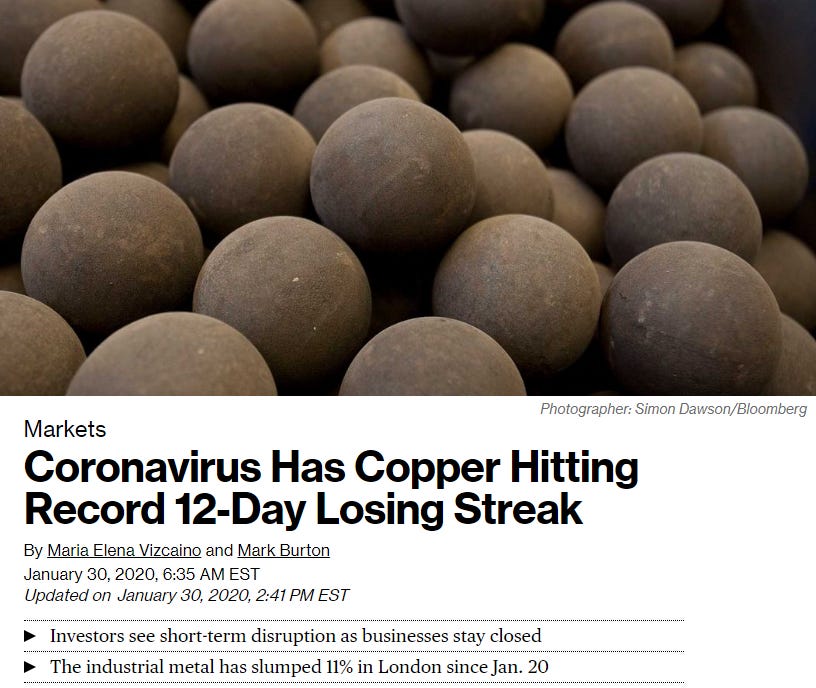
However, there is the trader in me, and then the investor. When I step back and examine the way this coronavirus situation is unfolding, I am becoming more convinced than ever that a massive stimulus in on its way.
This morning we received news that EU Zone was preparing to loosen their fiscal tightness - from a Reuters story:
BRUSSELS, Feb 7 (Reuters) - Euro zone finance ministers are set to agree this month a more growth-friendly fiscal policy, three EU officials said on Friday, a change from current targets that would pave the way for more spending in Germany amid fears of a downturn.
Repeated attempts to boost investment and growth in the 19-country bloc have failed in past years as Germany, the euro zone's largest economy, kept posting large budget surpluses despite calls to spend more.
But now, amid fresh recession fears in Germany and concerns about the impact on the global economy of the coronavirus outbreak in China, euro zone countries have reached a preliminary agreement to increase spending in the event of a downturn.
"If downside risks were to materialise, fiscal responses should be differentiated, aiming for a more supportive stance at the aggregate level," a draft text agreed by euro zone envoys said, according to an official who had access to it.
Other two senior EU officials confirmed the preliminary compromise, which needs to be formalised by euro zone finance ministers at a meeting in Brussels on Feb. 17.
The text, agreed after lengthy negotiations, stresses that higher spending would need to be compliant with EU fiscal rules which mandate a deficit below 3% of gross domestic product, among other requirements.
Despite its restrictions, the move would mark a departure from past statements in which euro zone ministers had recommended a "broadly neutral" fiscal stance, despite weak economic growth.
The change would allow governments with more solid finances to focus more on growth rather than stability as they begin planning for next year's national budgets.
It could also send a positive message to investors that the bloc is finally heeding calls from the European Central Bank to complement its loose monetary policy with a fiscal push that could make it more effective.
Germany has long insisted on keeping budgets under tight control in a bid to reduce imbalances in countries of the bloc with high levels of debt, like Italy or Greece.
But views in Berlin may be slowly changing after weak growth last year and concerns that in the last quarter Germany may have fallen into recession because of tumbling industry output.
Germany's Finance Minister Olaf Scholz has said in past months that Germany would loosen the purse strings in the event of an economic crisis, but despite last year's slowdown it has posted large budget surpluses in the first nine months, Eurostat figures released in January show.
The EU Commission will unveil on Thursday its quarterly forecasts for the euro zone economy and the figures will be discussed by ministers when they adopt the recommendation on the bloc's fiscal stance. That could help the case of those supporting more spending, an EU official said.
Yeah, I get it. The Germans are still a long way from unleashing the full power of a European Zone fiscal stimulus program. The point of highlighting this article is not to say "this is it - the fiscal is on its way." No, by the time the stimulus comes, the market will have already discounted a fair amount. My point is that sentiment within governments is shifting. They are scared by this virus. And rightfully so.
The coronavirus has shut down a large part of Asia. It will probably be the largest economic slowdown we have ever witnessed in such a short period of time. There is no denying that this situation is unprecedented.
There are two questions you need to ask yourself:
How much is baked into the markets?
What are the second order effects of this situation?
Let's start with the first question. There are a bunch of shrewd hedge fund managers who think the market is about to have its Wile E. Coyote moment:

I showcase Mark Spiegel's recent twitter post because he is so bearish, and I know he is a good sport who won't mind me calling him out. He owns his forecast and is not afraid to say so in the most public fashion:
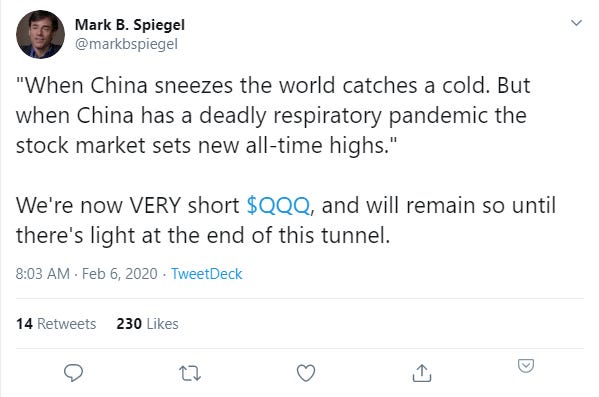
Yeah, it certainly feels like the market is completely ignoring the serious ramifications of shutting down the second biggest economy in the world. Could this be the moment when the Coyote is hanging mid-air right before plunging to his demise (at least until next week)? Sure. If the virus were to get out in the Western world's population and start multiplying at the speed at which it did in the initial Chinese outbreak, then markets would go NO BID.
However, I would suggest everything short of that apocalyptic scenario is baked in. So if you are in the camp of "it's coming throughout the world and there is no stopping it", then stop reading my post. I will have been wrong about society's ability to contain the virus. All assets would need to be massively repriced. And I don't want to put words into Mark's mouth, but I assume this is somewhere along the lines of his thinking.
I was chatting with a hedge fund pal the other day and he told me, "this is the largest market mis-pricing in the history of financial markets." Wait... what?
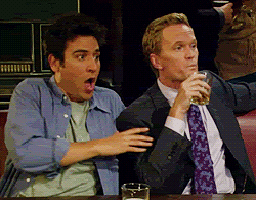
The "largest mis-pricing in the history of financial markets?" I nearly spit out my water. Geez-louise. That's even more bearish than Mark.
Although I understand their dis-belief about how the American stock market has continued to rise in the face of this development, I think it's the result of a massive monetary adrenaline boost from the Chinese authorities.
I will not bother arguing about the proper amount of monetary stimulus from the Chinese. I have no ability to judge whether the announced operations will be sufficient. But I am confident of a couple of things; you can't trust whatever the Chinese are reporting anyway, so why are we discussing the amounts like they are factual? And secondly, the Chinese will do WHATEVER IT TAKES.
So when financial assets throughout the world are flying higher, it does not surprise me one bit. The tidal wave of monetary stimulus is overwhelming anyone trying to fight the coming wall of liquidity by shorting the market.
Now one might argue they are artificially pumping financial asset prices and therefore, if you are willing to take a longer-term view, this is a great sale. I get that argument.
However, I think this monetary stimulus is just the start. It will be followed by fiscal. And then more monetary. And even more fiscal.
Remember ECB Chairman Draghi's "whatever it takes?" That crisis was a self-inflicted financial crisis.
This is an actual real-life emergency. There will be no limits to what governments spend or Central Banks print. Full stop. There will be no worrying about the 1%'ers getting too much of the benefit. Nope. The virus does not discriminate based on wealth, and if anything, the less fortunate are probably more exposed due to the same lack of resources.
Every single government in the world will respond quickly and decisively if this situation gets worse. They will monetize the crap out of everything. Central Banks will be back to buying anything with a CUSIP.
Although I understand how a deterioration of the situation should be deflationary, that's assuming the unit we use to measure everything stays the same. It won't.
Now, you might say we need to first get that deflationary panic before the response comes. Could be. But that's the bet you are taking. You are assuming we get deflation before inflation. Not only that, I would argue many are positioned for that outcome.
Few are looking two steps ahead and asking themselves what's the bigger risk; commodities falling 25% as the virus spreads or governments panic and send them up 50%. Given we have already tumbled 10%+ in economically sensitive commodities such as copper and oil, I believe risk reward favours betting on the latter.
If the virus situation gets worse, these commodities sag another 5% before the governments unleash an even bigger stimulus at which point the market realizes deflation is off the table, and they rush to own real assets, sending them higher. If the virus situation becomes contained, these assets are cheap relative to other risk assets and they rally back the 10% and in fact, head higher because there will still be lots of stimulus.
Now some might argue that the odds dramatically favour the dip before the rise. I'm willing to take the other side of that trade. The reason? This is like the '72 Canada Cup for the Chinese. It's do or die for the Chinese leadership and they need a Paul Henderson Goal of the Century.
When President Xi took over a decade ago, he committed to a Xiakang society by 2021:
"The centenary of the founding of the Communist Party of China in 2021, at which point, a full Xiaokang society would have been achieved. While "Xiaokang" – roughly meaning "moderately well-off" – is a relatively abstract theory rooted in both Confucianism and socialist ideology, the party has outlined this in objective, quantitative terms: a doubling of the 2010 per capita income figures."
This will be a monumental point for his leadership. Make no mistake. He will make Draghi's "whatever it takes" look like child's play.
And if you want your economy humming in 2021, you start stimulating now.
So maybe the bearish-financial-prepper crowd will be correct and we will collapse in the coming weeks as the virus spreads. But I don't think that's the right bet. I think the correct stance is to assume there will be monetary (already upon us) and fiscal stimulus (coming shortly) the likes we have never seen. The monetary stimulus is already pushing up financial assets, the fiscal will push up real assets. The time to buy those commodities is today.
So what am I buying? By far and away, my favourite is copper.
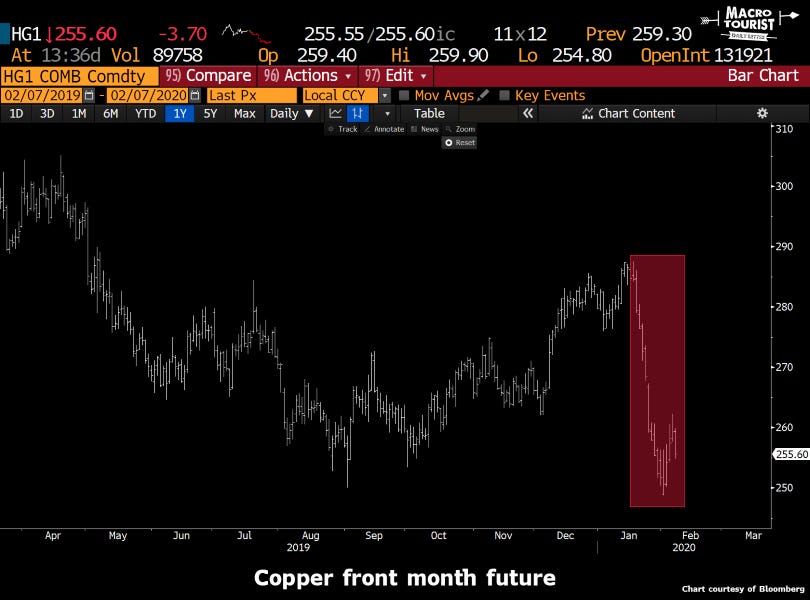
I like copper because it should benefit from the ongoing move to electric vehicles. I have been buying copper futures down here in the sub 260 level. My hope is that 250 support holds, but if not, then I will try to trade around it and buy more as we head down to 225 or 220.
Other commodities I am picking away at? Crude oil. Nat gas (I know this one has less to do with the flu). I am also thinking about just buying Glencore or some other commodity firm that is better able to navigate the coming commodity bull market.
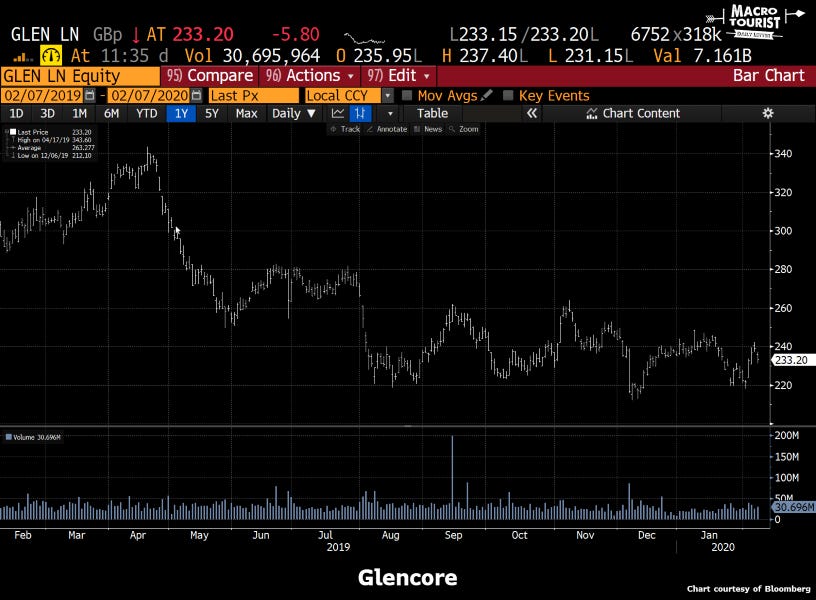
I am not saying you should rush out and buy Nasdaq futures because everything is hunky dory with the world. However, I am suggesting you think about the second order effects of this situation. Buying commodities seems the best play around. I think they go higher, it's only a question of timing.
Thanks for reading,
Kevin Muir
the MacroTourist

